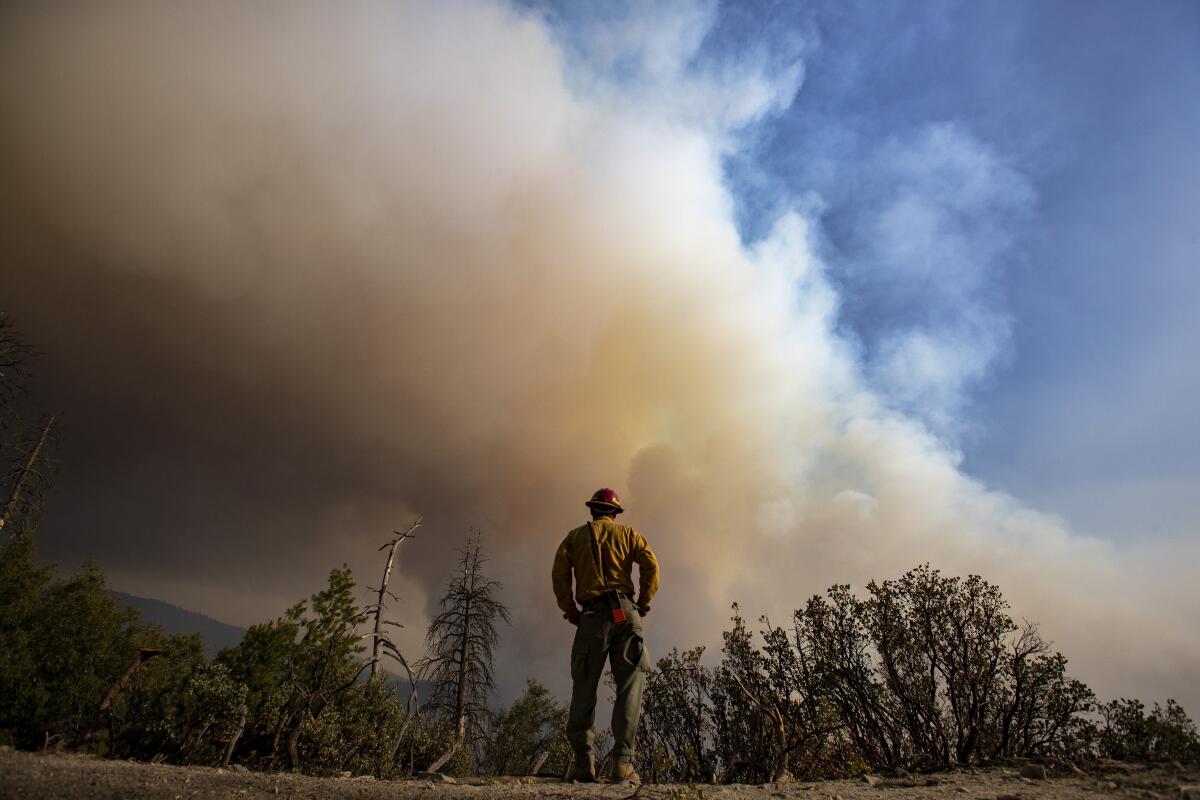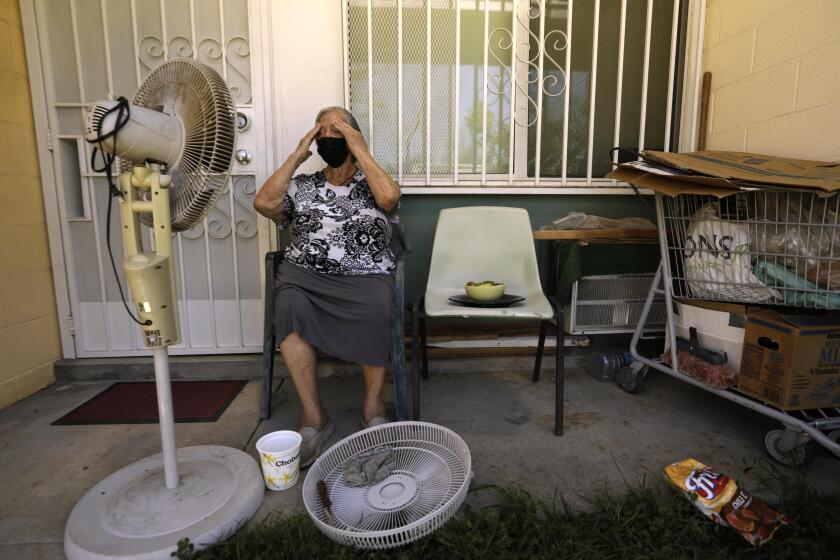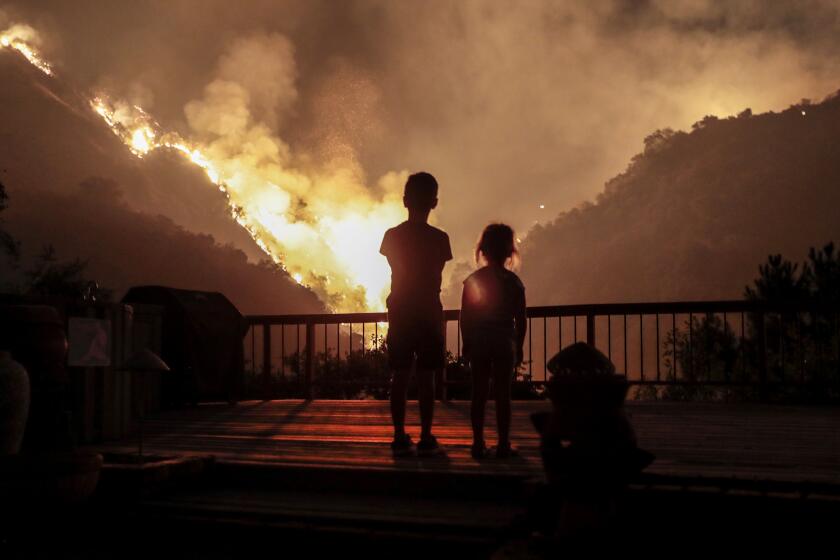Op-Ed: As climate change wrecks our health, we’ll need climate doctors

- Share via
On Monday, the United Nations’ Intergovernmental Panel on Climate Change dropped its latest assessment report — an exhaustive and far-reaching inventory of human vulnerabilities to an increasingly inhospitable planet and our strategies to adapt.
The precision with which these data were presented — an accumulation of decades of climate science — reinforces the overwhelming conclusion that our ecosystems are under such stress that widescale human suffering is all but certain. As the report puts it, we have “a brief and rapidly closing window of opportunity to secure a livable and sustainable future for all.”
The report focuses on how the world can better adapt to the accelerating effects of climate change to reduce risks and protect vulnerable people.
But within this gloomy news, there is a spark of optimism: That window has not yet shut. And there’s growing sentiment among the healthcare providers I know that this is becoming our fight. We are ready, to paraphrase the IPCC report, to act on solutions that address social inequities, vary our responses based on a wide range of climate risks and make our adaptation to climate change better at reducing harm.
Humans can expect more widespread sickness, injuries and disease from a changing climate. Healthcare is accordingly coalescing around the idea that we need to upgrade our medical training programs to address climate — and even train “climate doctors.”
Healthcare providers need to be at the table to articulate the health consequences of climate change. Record heat exposures, flooding, wildfires, hurricanes and forced displacement will exacerbate existing health disparities, most predominantly in disadvantaged populations. With the right training and mission, we can create patient-centric policies when working alongside business executives, community leaders and policymakers to advocate for climate action, address environmental justice issues and help health systems reduce carbon emissions.
Here’s how climate doctors can lead on smart policy:
Education: We start today, training our medical students in basic connections between climate and health — a topic largely missing from medical education. Medical schools should create fellowships to mold leaders with the policy expertise to build coalitions and mobilize constituencies. And because we cannot wait the years for our students and trainees to assume positions of influence, we should scale up professional development programs (certificates, diplomas) for practicing clinicians to gain the confidence and skills to dive into the fray now.
Environmental justice: Climate doctors can contextualize clinical care with current issues of environmental justice, recognizing that our most vulnerable communities will bear disproportionate burdens from climate-driven health stressors. We can lean on historical successes within medicine: pediatricians spearheading lead exposure mitigation in communities; emergency physicians expanding acute care services to include social work and substance abuse support; family practitioners strategizing on how to change lifestyle choices to reduce cardiovascular risk. The core messaging for any policy discussion must lead with the same prognosis: When it comes to climate change, poor and sick people will get pummeled.
Research: Government funding streams and private foundations are ramping up the call for healthcare researchers to better understand climate risks and investigate how to make our communities more resilient. Such research can measure, for example, the health benefits of green spaces and low-carbon mass transit, the lifesaving effects of extreme heat mitigation and how environmental conditions exacerbate chronic disease. Data drive innovations in care, and we need to scale up research to better understand how to protect patients and achieve better outcomes in the face of climate threats.
A new U.N. climate report shows that the effects of climate change are widespread and growing. Further delay consigns us to more death and destruction.
Decarbonization: Healthcare is a huge and growing sector in the economy and is responsible for an estimated 8.5% of national carbon emissions. These emissions come from healthcare facility operations, energy use and the supply chains of healthcare goods and services. Climate doctors should push for strategic investments in renewables within healthcare systems’ energy mix and promote greener operations, including cutting down on anesthetics that are potent greenhouse gases (one of the most commonly used, desflurane, is estimated to have 3,766 times the greenhouse warming potential of carbon dioxide), increasing plant-based options in healthcare facilities’ food services and smarter purchasing plans to reduce the amount of single-use medical products.
Accountability: Government regulations are coming too, and maybe with penalties on payments to healthcare systems. At last fall’s COP26 Conference in Glasgow, Scotland, Assistant Secretary for Health Dr. Rachel Levine pledged to reduce emissions at federal health facilities. Last year, when asked if the Department of Health and Human Services’ new climate office would cut Medicare payments to hospitals that don’t reduce their carbon emissions, Health and Human Services Secretary Xavier Becerra said, “We’re going to try to use every tool at our disposal.”
Even during the height of discord during the pandemic, healthcare workers were praised for their professionalism and indefatigable support of their communities under threat. This workforce, if schooled in existing and novel climate threats and armed with strategies and resources for change, can play a central role in strengthening our communities for the climate challenges ahead.
Jay Lemery is a professor of emergency medicine at the University of Colorado School of Medicine, co-director of its Climate & Health Program and a member of the National Academy of Medicine.
More to Read
A cure for the common opinion
Get thought-provoking perspectives with our weekly newsletter.
You may occasionally receive promotional content from the Los Angeles Times.












